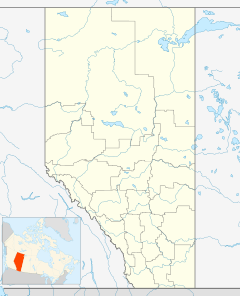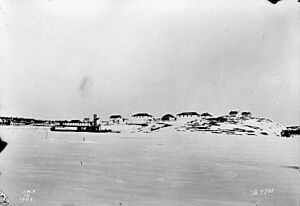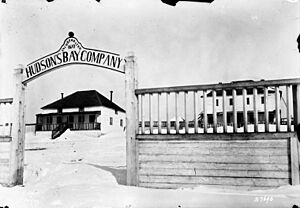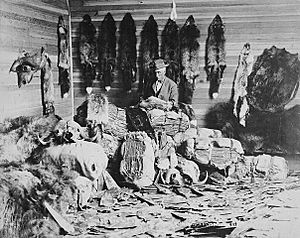Fort Chipewyan facts for kids
Quick facts for kids
Fort Chipewyan
|
|
|---|---|
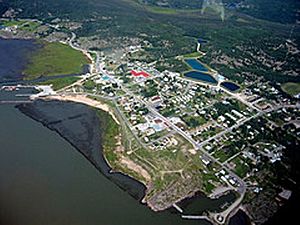
Aerial view of Fort Chipewyan
|
|
| Country | Canada |
| Province | Alberta |
| Region | Northern Alberta |
| Census division | 16 |
| Specialized municipality | RM of Wood Buffalo |
| Settled | 1788 |
| Government | |
| • Type | Unincorporated |
| Area
(2021)
|
|
| • Land | 9.93 km2 (3.83 sq mi) |
| Elevation | 221 m (725 ft) |
| Population
(2021)
|
|
| • Total | 798 |
| • Density | 80.4/km2 (208/sq mi) |
| Time zone | UTC−7 (MST) |
| • Summer (DST) | UTC−6 (MDT) |
| Postal code |
T0P 1B0
|
| Area code(s) | +1-780 |
| Climate | Dfc |
Fort Chipewyan /ˈtʃɪpəwaɪən, -pwaɪ-, ˈtʃɪpəwən/, often called Fort Chip, is a small community in northern Alberta, Canada. It's located on the western edge of Lake Athabasca, right next to Wood Buffalo National Park. This hamlet is about 223 kilometers (139 miles) north of Fort McMurray.
Contents
A Look Back in Time
Fort Chipewyan is one of the oldest European settlements in Alberta. It was started as a trading post in 1788 by Peter Pond of the North West Company. The fort was named after the Chipewyan people who lived in the area.
The "Athens of the Arctic"
One of the people who helped establish the fort was Roderick Mackenzie of Terrebonne. He loved books and wanted to create a library at the fort. This library, built in 1790, had over 2000 books! It became very famous across a large area called Rupert's Land. Mackenzie even called it "the little Athens of the Arctic regions."
Rival Trading Posts
From about 1815 to 1821, the Hudson's Bay Company (HBC) had its own trading post nearby. It was called Fort Wedderburn. This fort was set up by John Clarke. Later, Sir George Simpson arrived here in 1820–1821. He started to reorganize the fur trade, which was a very important business back then.
Important Events
In 1820, John Franklin started his Arctic journey from Fort Chipewyan. Later, in 1887–1888, there was a big famine in the area. It wasn't until 1959 that Fort Chipewyan finally got electric lights!
Historic Places to See
Old Fort Point is where the very first Fort Chipewyan was built in 1788. It was named a National Historic Site of Canada in 1930. Other important historic places in the community include the site of the third Fort Chipewyan (built in 1803). You can also see the Anglican Church built in 1880, the Day School from 1874, and the Roman Catholic Mission Church built in 1909.
Weather in Fort Chipewyan
Fort Chipewyan has a subarctic climate. This means it has long, very cold, and dry winters. The summers are short, warm, and wetter. The hottest temperature ever recorded here was 39.3 degrees Celsius (102.7 degrees Fahrenheit) on June 30, 2021. The coldest temperature ever recorded was -51.1 degrees Celsius (-60.0 degrees Fahrenheit) on February 1, 1917.
| Climate data for Fort Chipewyan (Fort Chipewyan Airport) Climate ID: 3072658; coordinates 58°46′N 111°07′W / 58.767°N 111.117°W; elevation: 232.0 m (761.2 ft); 1981–2010 normals, extremes 1883–present |
|||||||||||||
|---|---|---|---|---|---|---|---|---|---|---|---|---|---|
| Month | Jan | Feb | Mar | Apr | May | Jun | Jul | Aug | Sep | Oct | Nov | Dec | Year |
| Record high °C (°F) | 10.5 (50.9) |
15.0 (59.0) |
14.5 (58.1) |
27.1 (80.8) |
32.3 (90.1) |
39.3 (102.7) |
36.1 (97.0) |
34.1 (93.4) |
31.2 (88.2) |
26.5 (79.7) |
17.0 (62.6) |
13.9 (57.0) |
39.3 (102.7) |
| Mean daily maximum °C (°F) | −16.5 (2.3) |
−12.5 (9.5) |
−4.6 (23.7) |
5.5 (41.9) |
13.8 (56.8) |
20.4 (68.7) |
23.0 (73.4) |
20.9 (69.6) |
14.0 (57.2) |
4.8 (40.6) |
−6.7 (19.9) |
−13.2 (8.2) |
4.1 (39.4) |
| Daily mean °C (°F) | −21.9 (−7.4) |
−18.4 (−1.1) |
−11.3 (11.7) |
−0.6 (30.9) |
7.7 (45.9) |
14.1 (57.4) |
17.0 (62.6) |
14.9 (58.8) |
8.7 (47.7) |
0.6 (33.1) |
−11.1 (12.0) |
−18.2 (−0.8) |
−1.5 (29.3) |
| Mean daily minimum °C (°F) | −27.1 (−16.8) |
−24.3 (−11.7) |
−18.0 (−0.4) |
−6.6 (20.1) |
1.5 (34.7) |
7.8 (46.0) |
11.0 (51.8) |
8.9 (48.0) |
3.4 (38.1) |
−3.6 (25.5) |
−15.4 (4.3) |
−23.2 (−9.8) |
−7.1 (19.2) |
| Record low °C (°F) | −50.0 (−58.0) |
−51.1 (−60.0) |
−47.8 (−54.0) |
−35.6 (−32.1) |
−25.6 (−14.1) |
−7.0 (19.4) |
−3.9 (25.0) |
−6.7 (19.9) |
−12.2 (10.0) |
−30.0 (−22.0) |
−39.8 (−39.6) |
−49.4 (−56.9) |
−51.1 (−60.0) |
| Average precipitation mm (inches) | 14.9 (0.59) |
14.1 (0.56) |
15.8 (0.62) |
16.0 (0.63) |
27.2 (1.07) |
44.4 (1.75) |
67.4 (2.65) |
50.2 (1.98) |
44.0 (1.73) |
28.8 (1.13) |
24.5 (0.96) |
18.4 (0.72) |
365.7 (14.40) |
| Average rainfall mm (inches) | 0.3 (0.01) |
0.1 (0.00) |
0.2 (0.01) |
6.2 (0.24) |
24.5 (0.96) |
44.4 (1.75) |
67.4 (2.65) |
50.2 (1.98) |
43.2 (1.70) |
13.3 (0.52) |
0.4 (0.02) |
0.2 (0.01) |
250.4 (9.86) |
| Average snowfall cm (inches) | 14.8 (5.8) |
14.4 (5.7) |
15.7 (6.2) |
9.8 (3.9) |
2.7 (1.1) |
0.0 (0.0) |
0.0 (0.0) |
0.0 (0.0) |
0.7 (0.3) |
15.5 (6.1) |
24.7 (9.7) |
18.5 (7.3) |
116.9 (46.0) |
| Source: Environment and Climate Change Canada | |||||||||||||
Who Lives Here?
In 2021, the Census of Population counted 798 people living in Fort Chipewyan. Most of the people living in Fort Chipewyan are from the Cree and Chipewyan (Dene) First Nations, as well as Métis people.
Getting Around
Fort Chipewyan is not easy to reach! There are no regular roads that connect it to other towns all year round.
By Air
The community has its own airport, the Fort Chipewyan Airport, which opened on June 18, 1966. Flying is one of the main ways to get to Fort Chipewyan in the summer.
By Water
During the summer, you can also reach the hamlet by boat. Boats travel from Fort McMurray along the Athabasca River.
By Road
In winter, special winter roads are built. These temporary roads allow people to drive to Fort Chipewyan from Fort Smith to the north and from Fort McMurray to the south. People in Fort Chipewyan have asked the government to build a permanent road. This would make it much easier to travel to and from the community all year long.
Green Energy
Solar Power in Fort Chipewyan
In September 2014, the community started using solar power. They installed a small solar panel system on the Elder Lodge. This system helps provide backup power in emergencies.
The Fort Chipewyan Solar Farm is a big project that uses solar energy. It was built between 2019 and 2020. Three local groups, the Athabasca Chipewyan First Nation, Mikisew Cree First Nation, and Fort Chipewyan Métis Local 125, own this project.
The solar farm is expected to provide about 25 percent of Fort Chipewyan's energy. This means it will replace about 800,000 liters of diesel fuel each year! It also has a battery system to store extra power. The Canadian government gave $4.5 million and the Alberta government gave $3.3 million to help build this $7.8 million project.
The solar farm has 5,760 solar panels and can produce 2,200 kilowatts of power. Because of this solar farm, about 25 fewer large trucks carrying diesel fuel will need to travel on the winter ice road from Fort McMurray. This is great for the environment and for the community!
 | William M. Jackson |
 | Juan E. Gilbert |
 | Neil deGrasse Tyson |


